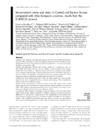Identificador persistente para citar o vincular este elemento:
https://accedacris.ulpgc.es/jspui/handle/10553/75535
| Título: | Micronutrient intake and status in Central and Eastern Europe compared with other European countries, results from the EURRECA network | Autores/as: | Novakovic, Romana Cavelaars, Adrienne E. J. M. Bekkering, Geertruida E. Roman-Vinas, Blanca Ngo, Joy Gurinovic, Mirjana Glibetic, Maria Nikolic, Marina Golesorkhi, Mana Medina, Marisol Warthon Satalic, Zvonimir Geelen, Anouk Majem, Lluis Serra van't Veer, Pieter de Groot, Lisette C. P. G. M. |
Clasificación UNESCO: | 3206 Ciencias de la nutrición 320608 Nutrientes |
Palabras clave: | Micronutrient Intake Status Central And Eastern Europe |
Fecha de publicación: | 2013 | Publicación seriada: | Public Health Nutrition | Resumen: | Objective: To compare micronutrient intakes and status in Central and Eastern Europe (CEE) with those in other European countries and with reference values.Design: Review of the micronutrient intake/status data from open access and grey literature sources from CEE.Setting: Micronutrients studied were folate, iodine, Fe, vitamin B-12 and Zn (for intake and status) and Ca, Cu, Se, vitamin C and vitamin D (for intake). Intake data were based on validated dietary assessment methods; mean intakes were compared with average nutrient requirements set by the Nordic countries or the US Institute of Medicine. Nutritional status was assessed using the status biomarkers and cut-off levels recommended primarily by the WHO.Subjects: For all population groups in CEE, the mean intake and mean/median status levels were compared between countries and regions: CEE, Scandinavia, Western Europe and Mediterranean.Results: Mean micronutrient intakes of adults in the CEE region were in the same range as those from other European regions, with exception of Ca (lower in CEE). CEE children and adolescents had poorer iodine status, and intakes of Ca, folate and vitamin D were below the reference values.Conclusions: CEE countries are lacking comparable studies on micronutrient intake/status across all age ranges, especially in children. Available evidence showed no differences in micronutrient intake/status in CEE populations in comparison with other European regions, except for Ca intake in adults and iodine and Fe status in children. The identified knowledge gaps urge further research on micronutrient intake/status of CEE populations to make a basis for evidence-based nutrition policy. | URI: | https://accedacris.ulpgc.es/handle/10553/75535 | ISSN: | 1368-9800 | DOI: | 10.1017/S1368980012004077 | Fuente: | Public Health Nutrition [ISSN 1368-9800], v. 16 (5), p. 824-840, (Mayo 2013) |
| Colección: | Artículos |
Citas SCOPUSTM
39
actualizado el 08-jun-2025
Citas de WEB OF SCIENCETM
Citations
36
actualizado el 25-ene-2026
Visitas
54
actualizado el 10-ene-2026
Descargas
57
actualizado el 10-ene-2026
Google ScholarTM
Verifica
Altmetric
Comparte
Exporta metadatos
Los elementos en ULPGC accedaCRIS están protegidos por derechos de autor con todos los derechos reservados, a menos que se indique lo contrario.
